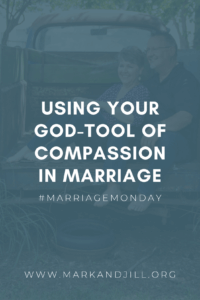 Last week on the blog, Mark shared a little bit about his journey of surrender. So this week for #MarriageMonday, I wanted to share about a journey of compassion I’ve been on over the years.
Last week on the blog, Mark shared a little bit about his journey of surrender. So this week for #MarriageMonday, I wanted to share about a journey of compassion I’ve been on over the years.
Colossians 3:12–13 says, “Put on then, as God’s chosen ones, holy and beloved, compassionate hearts, kindness, humility, meekness, and patience, bearing with one another and…forgiving each other.”
I have often talked about how I tend to be a “buck up” person. (In fact, here’s a podcast episode all about that part of my story.) When I have operated as a buck-up mom and a buck-up wife, that typically means I’m pretty low on compassion.
Any other buck up friends out there?
For years I claimed, “This is just the way God made me.” But then I did a study on the character of God…
When I got to “God is compassionate,” I gulped with conviction. If God is compassionate and I’m created in the image of God, then that means I have compassion inside of me. Somewhere along the way I squelched compassion with a buck-up mindset. So that means I can become compassionate! Over time I’ve come to understand compassion really is one of our much-needed God-tools for marriage and any relationship we have.
Compassion feels. It builds bridges. Compassion creates a sense of safety and security in your marriage and in the relationships that mean the most to you. Learning to listen with empathy helps your spouse trust you more. It causes them to feel validated and loved. I wrote about compassion from different relational perspectives in all three of my No More Perfect books. In No More Perfect Moms, we focus on self-compassion. No More Perfect Kids explores the importance of compassion in parenting. No More Perfect Marriages obviously explores the role of compassion in marriage.
Compassion helps you slow down, tune in, and really connect to those you love. It’s a God-tool that’s so underused in marriage, particularly as stress increases, margin decreases, and you become more familiar with your spouse’s imperfections.
When Mark went through his midlife crisis, God used those nine months to grow me in compassion. I was initially hurt and angry, of course. Soon, however, I began to see Mark as confused and hurting. He wasn’t the enemy but instead was being blinded by the enemy. He had lost his way. I believe the more I used the God-tool of compassion, the more it opened me up to love “unhumanably.”
Do you need to increase your use of the God-tool of compassion as well? Here are three practical ways:
1) Focus on the feelings, not a solution. This is where the old adage, “People don’t care how much you know until they know how much you care,” comes into play. You don’t have to agree with emotions when you validate them. You simply have to let the other person know you are connecting to the reality of what they’re feeling.
2) Look at your spouse through God’s eyes. See them as broken. Wounded. In process. In need of a Savior. Struggling. Lost. Confused. Imperfect. See them through eyes of grace, love, and compassion.
3) Respond with empathetic, validating statements. “I bet that was so disappointing,” or “I’m sure that hurt your heart deeply,” or “That breaks my heart. I would imagine it broke yours,” or “I’m so sorry. I’m sure that was painful for you to experience.” These kinds of caring responses let your spouse know they are heard and cared for.
Several years ago, I was teaching my No More Perfect Kids workshop at a church. I talked about compassion in parenting and how important it is to relate with compassion with your kids. At the end of the session, I had a mom come talk to me in tears. “When you were talking about compassion,” she said, “God took my focus to my marriage. My husband lost his job six months ago when the company he was with restructured. Every day I ask him what he’s done to find a job. How many résumés did you send out? Who did you email? Never once have I thought about how he might be feeling in this hard season. I’ve never tried to feel—I’ve only barked orders to fix. I’m going home today to apologize and build a bridge from my heart to his with compassion. Thank you for helping me see this.”
That, my friend, is what the God-tool of compassion looks like in real married life.
So today I just want to leave you with a couple questions: How are you at using your God-Tool of compassion? And where do you need to be intentional about connecting with the heart of your spouse this week?
GET INSTANT ACCESS TO MARK AND JILL SAVAGE'S 1 CORINTHIANS 13 FOR MARRIAGE PRINTABLE
Sign up to receive the FREE 1 Corinthians 13 for Marriages printable, available exclusively for subscribers.
(By signing up you are also agreeing to receive periodic e-mails to encourage you. I think you’ll enjoy hearing from me, but you can unsubscribe at anytime. You can view our privacy policy here.)












Thanks
Absolutely!